英文合同句式及用词特点
- 格式:docx
- 大小:34.02 KB
- 文档页数:12
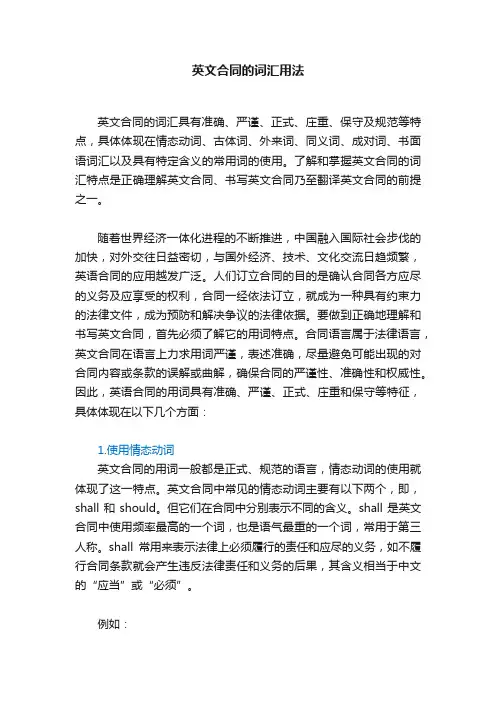
英文合同的词汇用法英文合同的词汇具有准确、严谨、正式、庄重、保守及规范等特点,具体体现在情态动词、古体词、外来词、同义词、成对词、书面语词汇以及具有特定含义的常用词的使用。
了解和掌握英文合同的词汇特点是正确理解英文合同、书写英文合同乃至翻译英文合同的前提之一。
随着世界经济一体化进程的不断推进,中国融入国际社会步伐的加快,对外交往日益密切,与国外经济、技术、文化交流日趋频繁,英语合同的应用越发广泛。
人们订立合同的目的是确认合同各方应尽的义务及应享受的权利,合同一经依法订立,就成为一种具有约束力的法律文件,成为预防和解决争议的法律依据。
要做到正确地理解和书写英文合同,首先必须了解它的用词特点。
合同语言属于法律语言,英文合同在语言上力求用词严谨,表述准确,尽量避免可能出现的对合同内容或条款的误解或曲解,确保合同的严谨性、准确性和权威性。
因此,英语合同的用词具有准确、严谨、正式、庄重和保守等特征,具体体现在以下几个方面:1.使用情态动词英文合同的用词一般都是正式、规范的语言,情态动词的使用就体现了这一特点。
英文合同中常见的情态动词主要有以下两个,即,shall和should。
但它们在合同中分别表示不同的含义。
shall是英文合同中使用频率最高的一个词,也是语气最重的一个词,常用于第三人称。
shall常用来表示法律上必须履行的责任和应尽的义务,如不履行合同条款就会产生违反法律责任和义务的后果,其含义相当于中文的“应当”或“必须”。
例如:1.The Seller shall present the following documents required for negotiation to the banks(卖方必须将下列单据提交银行附议).shall 的否定形式shall not 在英文合同中常表示不得发生的行为。
例如:2. Party A shall not supply the contracted commodity to other buyers in the above-mentioned territory(甲方不得向上述地区其他买主供应本合同项下商品)。
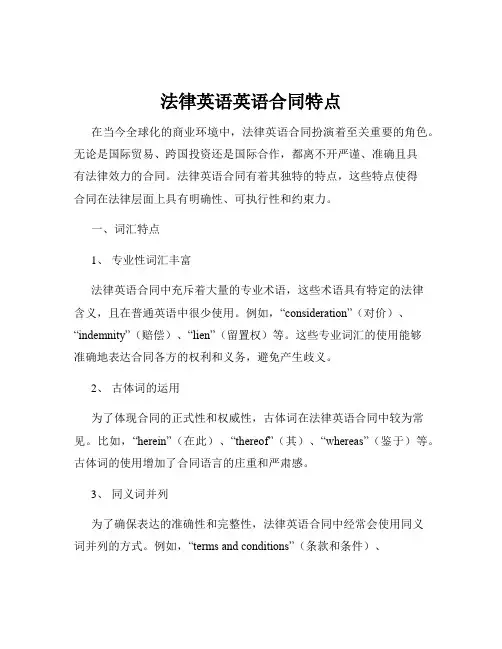
法律英语英语合同特点在当今全球化的商业环境中,法律英语合同扮演着至关重要的角色。
无论是国际贸易、跨国投资还是国际合作,都离不开严谨、准确且具有法律效力的合同。
法律英语合同有着其独特的特点,这些特点使得合同在法律层面上具有明确性、可执行性和约束力。
一、词汇特点1、专业性词汇丰富法律英语合同中充斥着大量的专业术语,这些术语具有特定的法律含义,且在普通英语中很少使用。
例如,“consideration”(对价)、“indemnity”(赔偿)、“lien”(留置权)等。
这些专业词汇的使用能够准确地表达合同各方的权利和义务,避免产生歧义。
2、古体词的运用为了体现合同的正式性和权威性,古体词在法律英语合同中较为常见。
比如,“herein”(在此)、“thereof”(其)、“whereas”(鉴于)等。
古体词的使用增加了合同语言的庄重和严肃感。
3、同义词并列为了确保表达的准确性和完整性,法律英语合同中经常会使用同义词并列的方式。
例如,“terms and conditions”(条款和条件)、“warranties and representations”(保证和陈述)等。
这种表达方式能够涵盖更广泛的含义,减少漏洞。
二、语法特点1、长句和复杂句居多法律英语合同为了能够详尽地规定各方的权利和义务,常常使用长句和复杂句。
这些句子结构严谨,逻辑严密,通过各种从句、短语和修饰成分来精确表达合同的内容。
2、被动语态频繁使用被动语态在法律英语合同中被广泛运用,以突出行为的对象和结果,而淡化行为的主体。
这样可以使合同的表述更加客观、中立,减少主观色彩。
3、名词化结构常见名词化结构能够将复杂的动作或过程转化为名词形式,使合同语言更加简洁、准确。
例如,“the performance of the obligations”(义务的履行)、“the determination of the damages”(损害的确定)等。
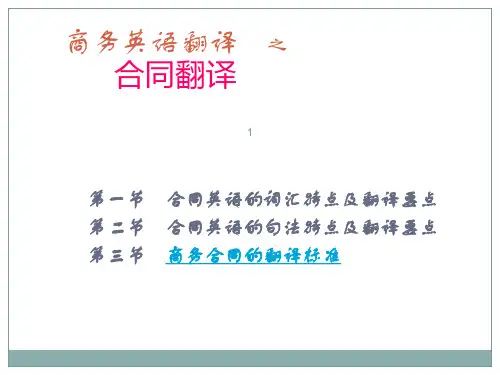
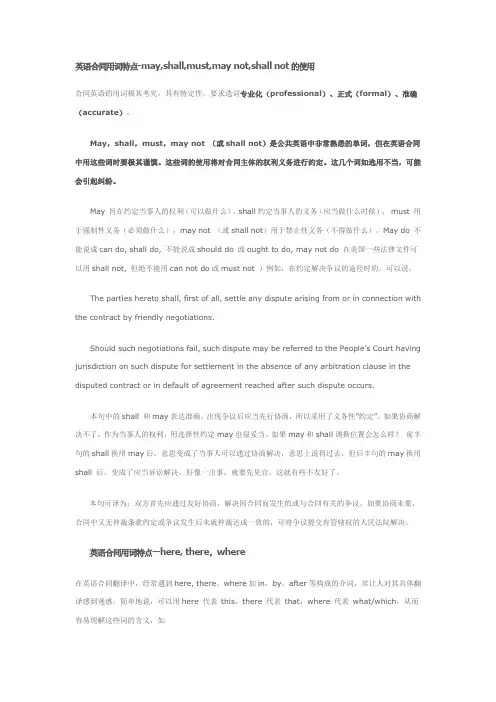
英语合同用词特点-may,shall,must,may not,shall not的使用合同英语的用词极其考究,具有特定性。
要求选词专业化(professional)、正式(formal)、准确(accurate)。
May,shall,must,may not (或shall not)是公共英语中非常熟悉的单词,但在英语合同中用这些词时要极其谨慎。
这些词的使用将对合同主体的权利义务进行约定。
这几个词如选用不当,可能会引起纠纷。
May 旨在约定当事人的权利(可以做什么),shall约定当事人的义务(应当做什么时候),must 用于强制性义务(必须做什么),may not (或shall not)用于禁止性义务(不得做什么)。
May do 不能说成can do, shall do, 不能说成should do 或ought to do, may not do 在美国一些法律文件可以用shall not, 但绝不能用can not do或must not )例如,在约定解决争议的途径时的,可以说:The parties hereto shall, first of all, settle any dispute arising from or in connection with the contract by friendly negotiations.Should such negotiations fail, such dispute may be referred to the People’s Court having jurisdiction on such dispute for settlement in the absence of any arbitration clause in the disputed contract or in default of agreement reached after such dispute occurs.本句中的shall 和may表达准确。
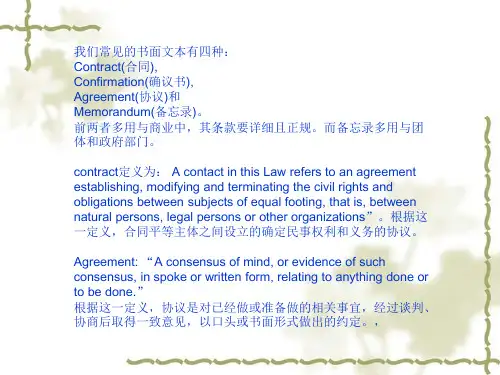
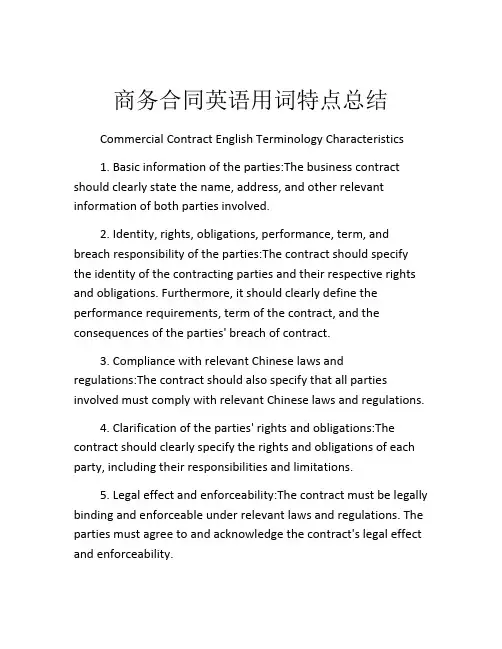
商务合同英语用词特点总结Commercial Contract English Terminology Characteristics1. Basic information of the parties:The business contract should clearly state the name, address, and other relevant information of both parties involved.2. Identity, rights, obligations, performance, term, and breach responsibility of the parties:The contract should specify the identity of the contracting parties and their respective rights and obligations. Furthermore, it should clearly define the performance requirements, term of the contract, and the consequences of the parties' breach of contract.3. Compliance with relevant Chinese laws and regulations:The contract should also specify that all parties involved must comply with relevant Chinese laws and regulations.4. Clarification of the parties' rights and obligations:The contract should clearly specify the rights and obligations of each party, including their responsibilities and limitations.5. Legal effect and enforceability:The contract must be legally binding and enforceable under relevant laws and regulations. The parties must agree to and acknowledge the contract's legal effect and enforceability.In summary, a well-drafted commercial contract in English should be comprehensive and clearly specify all relevant terms and conditions. It should be legally binding and enforceable, and the terms should be consistent with relevant Chinese laws and regulations.。
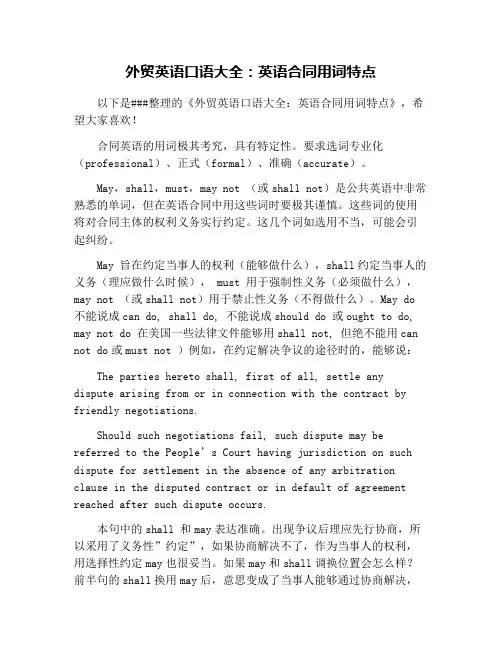
外贸英语口语大全:英语合同用词特点以下是###整理的《外贸英语口语大全:英语合同用词特点》,希望大家喜欢!合同英语的用词极其考究,具有特定性。
要求选词专业化(professional)、正式(formal)、准确(accurate)。
May,shall,must,may not (或shall not)是公共英语中非常熟悉的单词,但在英语合同中用这些词时要极其谨慎。
这些词的使用将对合同主体的权利义务实行约定。
这几个词如选用不当,可能会引起纠纷。
May 旨在约定当事人的权利(能够做什么),shall约定当事人的义务(理应做什么时候), must 用于强制性义务(必须做什么),may not (或shall not)用于禁止性义务(不得做什么)。
May do 不能说成can do, shall do, 不能说成should do 或ought to do, may not do 在美国一些法律文件能够用shall not, 但绝不能用can not do或must not )例如,在约定解决争议的途径时的,能够说:The parties hereto shall, first of all, settle any dispute arising from or in connection with the contract by friendly negotiations.Should such negotiations fail, such dispute may be referred to the People’s Court having jurisdiction on such dispute for settlement in the absence of any arbitration clause in the disputed contract or in default of agreement reached after such dispute occurs.本句中的shall 和may表达准确。
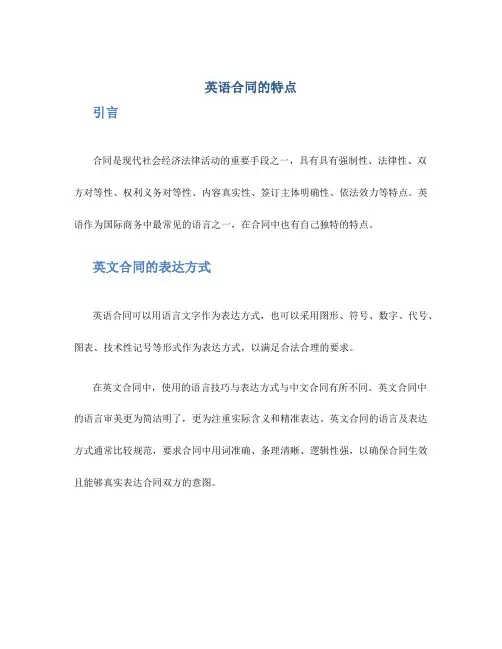
英语合同的特点引言合同是现代社会经济法律活动的重要手段之一,具有具有强制性、法律性、双方对等性、权利义务对等性、内容真实性、签订主体明确性、依法效力等特点。
英语作为国际商务中最常见的语言之一,在合同中也有自己独特的特点。
英文合同的表达方式英语合同可以用语言文字作为表达方式,也可以采用图形、符号、数字、代号、图表、技术性记号等形式作为表达方式,以满足合法合理的要求。
在英文合同中,使用的语言技巧与表达方式与中文合同有所不同。
英文合同中的语言审美更为简洁明了,更为注重实际含义和精准表达。
英文合同的语言及表达方式通常比较规范,要求合同中用词准确、条理清晰、逻辑性强,以确保合同生效且能够真实表达合同双方的意图。
英文合同的特点风格简洁英语合同注重简洁明了风格。
首先,英文合同通常使用简单句、短句进行表达,能够让双方快速理解。
其次,英文合同追求简约明了的原则,避免无谓的修饰,节约纸张空间,同时也提高了合同的可读性。
这些特点使英文合同简明扼要,形式上更加规范。
语言准确英文合同的语言准确、简洁,同时也更为注重术语的使用,因此在英文合同中,合同条款和内容都要求使用准确表述,尽可能准确地表述合同内涵,以达到合同有效和避免法律风险的目的。
这些特点要求合同双方使用清晰而确切的语言用词和约定来表达意思,以避免歧义,并可方便更好地解决任何争议或纠纷。
文化背景英文合同的文化背景与中文合同有所不同。
因为英语作为国际商务中最常见的语言之一,英文合同使用的语言技巧、语言习惯、文化背景等与中文合同有所不同,包括词汇选用、惯用法、用词习惯等。
合同双方需要在交流和谈判的过程中,尽可能了解彼此的文化背景、行业习惯、法律条文和法律程序,了解彼此的要求、权力和责任,才能签订清晰、公正合法的合同。
法律性质英文合同通常具有严格的法律性质,因此需要双方在签订英文合同前对相关法律条文和条例进行深入了解,确保合同符合当地法律法规和国际法律法规要求,以确保合同的效力和可执行性。
![[浅谈英文合同的用词特点及翻译技巧] 英文合同草拟技巧 pdf](https://uimg.taocdn.com/97fa2ff3a76e58fafab003ea.webp)
[浅谈英文合同的用词特点及翻译技巧] 英文合同草拟技巧 pdf 随着中外交流的深入,英文合同日益常见。文章简要分析了合同英语在选用词汇方面的特点,力求对商务英语的教学和学习有所裨益。
浅谈英文合同的用词特点及翻译技巧 合同英语的用词极其考究,具有特定性。要求选词专业化(professional)、正式(formal)、准确(accurate)。具体体现在下列方面:
1、May, shall, must ,may not (或shall not) 的使用 May, shall , must ,may not (或shall not)对学过英语的人再熟悉不过,但在合同中用这些词时要极其谨慎。权利义务的约见定部分构成了合同的主体。这几个词如选用不当,可能会引起纠纷。
may 旨在约定当事人的权利(可以做什么),Shall约定当事人的义务(应当做什么时候), must 用于强制性义务(必须做什么),may not (或shall not)用于禁止性义务(不得做什么)。May do 不能说成can do shall do,不能说成should do 或ought to do,may not do 在美国一些法律文件可以用shall not,但绝不能用can not do或must not )
例如,在约定解决争议的途径时的,可以说: The parties hereto shall, first of all, settle any dispute arising from or in connection with the contract by friendly negotiations. Should such negotiations fail, such dispute may be referred to the People's Court having jurisdiction on such dispute for settlement in the absence of any arbitration clause in the disputed contract or in default of agreement reached after such dispute occurs.
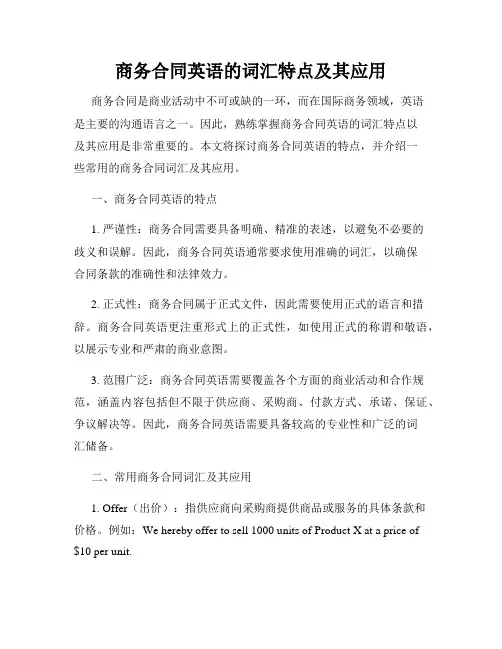
商务合同英语的词汇特点及其应用商务合同是商业活动中不可或缺的一环,而在国际商务领域,英语是主要的沟通语言之一。
因此,熟练掌握商务合同英语的词汇特点以及其应用是非常重要的。
本文将探讨商务合同英语的特点,并介绍一些常用的商务合同词汇及其应用。
一、商务合同英语的特点1. 严谨性:商务合同需要具备明确、精准的表述,以避免不必要的歧义和误解。
因此,商务合同英语通常要求使用准确的词汇,以确保合同条款的准确性和法律效力。
2. 正式性:商务合同属于正式文件,因此需要使用正式的语言和措辞。
商务合同英语更注重形式上的正式性,如使用正式的称谓和敬语,以展示专业和严肃的商业意图。
3. 范围广泛:商务合同英语需要覆盖各个方面的商业活动和合作规范,涵盖内容包括但不限于供应商、采购商、付款方式、承诺、保证、争议解决等。
因此,商务合同英语需要具备较高的专业性和广泛的词汇储备。
二、常用商务合同词汇及其应用1. Offer(出价):指供应商向采购商提供商品或服务的具体条款和价格。
例如:We hereby offer to sell 1000 units of Product X at a price of $10 per unit.2. Acceptance(接受):指采购商接受供应商的出价和条款,并同意订立合同。
例如:We acknowledge receipt of your offer and hereby accept the terms and conditions as stated.3. Payment terms(付款方式):指双方就货款支付方式和时间等条款达成的协议。
例如:Payment shall be made within 30 days after receiptof the goods.4. Delivery(交货):指供应商将商品或服务交付给采购商的行为。
例如:Delivery of the goods shall be made within 14 days after receipt ofthe purchase order.5. Warranty(保证):指供应商对其提供的商品或服务质量的承诺和保证。
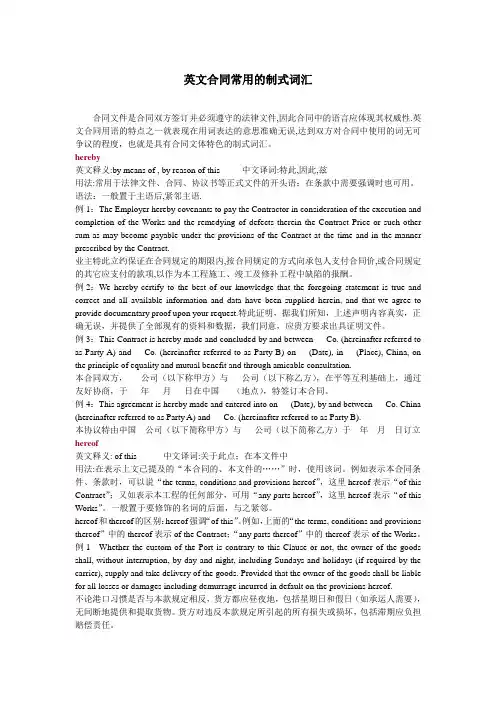
英文合同常用的制式词汇合同文件是合同双方签订并必须遵守的法律文件,因此合同中的语言应体现其权威性.英文合同用语的特点之一就表现在用词表达的意思准确无误,达到双方对合同中使用的词无可争议的程度,也就是具有合同文体特色的制式词汇。
hereby英文释义:by means of , by reason of this 中文译词:特此,因此,兹用法:常用于法律文件、合同、协议书等正式文件的开头语;在条款中需要强调时也可用。
语法:一般置于主语后,紧邻主语.例1:The Employer hereby covenants to pay the Contractor in consideration of the execution and completion of the Works and the remedying of defects therein the Contract Price or such other sum as may become payable under the provisions of the Contract at the time and in the manner prescribed by the Contract.业主特此立约保证在合同规定的期限内,按合同规定的方式向承包人支付合同价,或合同规定的其它应支付的款项,以作为本工程施工、竣工及修补工程中缺陷的报酬。
例2:We hereby certify to the best of our knowledge that the foregoing statement is true and correct and all available information and data have been supplied herein, and that we agree to provide documentary proof upon your request.特此证明,据我们所知,上述声明内容真实,正确无误,并提供了全部现有的资料和数据,我们同意,应贵方要求出具证明文件。
论涉外英文合同的语言特征及结构随着中国经济实力不断提升,国际贸易份额不断增大,在频繁的贸易往来及规范交易双方行为过程中,涉外英文合同扮演着举足轻重的作用。
因此,能够充分理解涉外英文合同的语言特征,对准确理解、审核或起草英语合同,确保自身在交易中的合法权益,以及全面正确的履行交易义务,起到越来越积极的作用。
因此,本文就涉外英文合同的词汇特征、句法特征以及篇章结构特征等三个方面进行阐述,以保证有效的类此合同的语言特征。
一、涉外英文合同的词汇特征涉外英文合同使用的英文词汇与日常英文有巨大的区别,更加具有专业性、正式性等特征。
1.专业词汇的使用。
合同作为有法律效力的文本,具有规范交易双方行为的作用。
作为具有特殊效力的材料,涉外英文合同在用词方面也有很大的专业性。
较为常见的专业实义词例如“不可抗力”、“赔偿”、“管辖”、“自力救济”、“损失”等,通过频繁接触熟悉,比较容易区别和理解。
只要注意与日常用词区别开来即可,例如,“不动产转让”用“conveyance”,而不是“transfer of real estate”;“赔偿”用“indemnities”,而不是“compensation”;“停业”用“wind up a business”,而不是“end a business”。
但是除了上述类似实义词外,专业虚词在涉外英文合同中更为常见,是合同承上启下、连贯始终的重要组成部分。
例如,“for and on behalf of”、“hereinafter referred to as”、“whereas”、“hereby”、“thereof”等。
2.正式词汇的使用。
涉外英文合同使用于正式交易领域,因此词汇也充分体现这一特征。
例如,“事实上”常用“in effect”,而不用“in fact”;“关于”常用“as regard”、“with regard to”、“relating to”、“concerning”等,而不用“about”;“在??之前”常用“prior to”,而不用“before”;“财务年度”常用“at the close of the fiscal year”,而不用“in the end of the fiscal year”;“认为”常用“deem”,而不用“consider”、“think”、“believe”等。
英文合同书语言特点透析English Contract Language Characteristics AnalysisEnglish contract language is a type of legal language that requires precision, clarity, and consistency. Here are some key characteristics of English contract language:Legal TerminologyEnglish contract language often utilizes legal terminology and jargon, which can be complex and confusing to the layperson. These terms are typically defined within the contract itself or in accompanying schedules or exhibits. Understanding these terms requires a familiarity with legal concepts and language. 被动语态English contract language often utilizes the passive voice, which can make contracts appear more objective and less controversial. The use of passive voice structures helps to emphasize the transaction or action being described, rather than the parties involved.Complex Sentence StructureEnglish contract language often contains complex sentence structure and clauses, which can make contracts difficult to read and comprehend. These sentences typically include subordinate clauses, conditional clauses, and other sentence types that provide additional details and conditions related to the main idea of the contract.Precision and CertaintyEnglish contract language must be precise and certain, as any ambiguity or vagueness can lead to disputes and litigation. Contracts should clearly define each party’s rights and obligations, as well as the conditions, terms, and circumstances under which those obligations will be performed. Contracts should avoid using subjective language or leaving any room for interpretation.Standardized LanguageEnglish contract language often utilizes standardized languagethat has been adopted by the legal profession. This language is designed to ensure clarity and consistency, as well as to reflect legal precedent and practice. Contracts should follow standardized language to the extent possible, ensuring that terms and conditions are understood and applied consistently. In conclusion, English contract language must be precise, clear, and objective to ensure that all parties understand their rights and obligations under the contract. It must use legal terminology, passive voice structures, complex sentence structure, and standardized language to ensure that the terms and conditions of the contract are accurately reflected and understood by all parties involved.在商务活动中,合同是一种具有法律效力的文件,规定了双方的权利和义务。
英文合同常用词汇和句型英文合同常用词汇第一节合同常用词(Usual Wording) 当大量接触英文合同,就会发现英文合同中有些词或短语出现的频率非常高,往往影响或决定了对合同的准确理解,下面就分门别类从常见实词和常见虚词两个方面进行具体介绍:一、英文合同常用虚词( Usual Function Words)1. Here/there/where+介词构成的古体词基本规则:Here 代表this,there 代表that,where 代表which 或what 即here/there/where介词二介词+this/that/which or what Hereby: by means of; by reas on of this特此,由此,兹等意。
例句:The Buyer hereby orders from the Seller the undermentioned goods subject to the followingcon diti on s:买方向卖方订购下列商品,条件如下:Herein:in this 。
此中,于此。
例句:The minimum royalty herein specified shall be paid by Party B to Party A. 在此规定的最低特许权使用费应由乙方付给甲方。
Hereinafter: later in the same Contract. 以下,在下文。
通常与to be referred to as, referred as, called 连用。
例句:This Agreement is made and concluded on _____ , (date) ____ (year), byand between____ (hereinafter called Party A) on the one hand and ____ (hereinafter called Party B) on the other hand. 本协议书于_______________________________ 年___月___日由(以下简称甲方)为一方,与_____ (以下简称乙方)为另一方签订。
英文合同特点一在全球贸易中,英文合同被广泛使用。
英文合同与其他语言的合同具有不同的特点。
在本文中,我们将讨论英文合同的特点之一,即其语言规范性和准确性。
语言规范性英文合同的语言规范性是其一个重要的特点。
合同中使用的英语必须是准确的、规范的、易于理解的。
在英文合同中,需要注意以下几个方面:1. 词汇准确性英文合同中的每一个词汇都必须有确切的含义,并且不能有歧义。
每个单词的含义都必须与合同的上下文相匹配。
因此,在草拟合同时,需要确保所使用的术语明晰准确,并采用可以获得广泛认可的标准术语。
2. 语法准确性英文合同的语法必须是准确的。
在合同中存在许多复杂的语句结构和长句,因此,需要确保语法结构严谨,以避免歧义。
良好的语法表达可以提高合同的清晰度和易读性,同时也可以降低各种歧义的发生率。
3. 文字风格的重要性在英文合同中,要使用简明、紧密、权威、严肃而完整的语言风格。
这一风格特点具有对各方的约束力,并能够帮助各方理解合同的内容和意义。
在合同中,要注意使用格式化的文字、数字、符号等,以便维持合同的可读性和易理解性。
准确性英文合同的准确性是其另一个重要特点。
英文合同所涉及的合同条款、条文,其中的每一个词句都必须是准确的,对出借方和借入方的权利和责任要以最准确的方式表达,确保语言的准确性可以避免合同条款存在歧义或解释上的偏见。
当一份英文合同的合法性或可执行性受到质疑或争议时,语言的准确性在决定案件最终结构中有着至关重要的作用。
因此,英文合同的准确性必须得到保障。
结论总之,语言规范性和准确性是英文合同的两个主要特点。
这两个特性密切相关,不能分割开来。
为了确保合同的有效性,草拟合同时必须十分注重这两个方面。
1
SENTENCE STRUCTURE AND WORDS CHARACTERISTICS OF CONTRACT
English contract sentences and words characteristics 1.句式结构特点(Sentence Structure) 句式结构特点( 句式结构特点 ) A. 句子冗长,结构严谨,语序复杂 )句子冗长,结构严谨, 英文合同为了准确、严密、清楚地表达, 多以庞杂的从句和/或短语并列,语序复杂 多变的长句面目出现,很少以简单句为主。 A.主句的状语的位置,一般放在助动词后, .主句的状语的位置, 行为动词前,与基础英语频度副词如; often,sometimes,always,never, seldom的位置相同
The Company shall, at all time during the term of the Joint Venture, effect and maintain full and adequate insurance against loss or damage by fire and such risks as are customarily issued in connection with the operation of the Company. 合资公司应在合资期间的任何时候,就火 灾以及此类与公司经营相关的其他风险所 造成的损失或损害进行投保,并保持充分 和适当的保险。
B.从句复杂,从句的状语,往往放在连词之后,从句的句子之前。例如: 之后,从句的句子之前 If, at any time during the execution of the Contract, either of the Parties to the contract is prevented from executing the Contract in case of Force Majeure such as war, serious fires, flood, typhoon and earthquake, etc., the time for execution of the Contract shall be extended for a period equal to the affect of those causes.
在合同履行期间的任何时候,合同任一方, 由于受到战争、严重火灾、洪水、台风和 地震等不可抗力事件的影响而不能履行合 同时,合同履行期应予延长,延长期限相 当于事件影响的时间。
C.主从复合句,从句经常用简略形式。 .主从复合句,从句经常用简略形式。 A party dissatisfied with the judgment may, within 15 day upon receipt of the judgment, file an appeal to the next upper People’s Court. 如不服本判决,该方可于接到判决之日起十五日 内向上一级法院提起上诉。
The Contractor shall, unless otherwise provided in the Contract, make his own arrangement for the engagement of all staff and labour, local or other, and for their payment, housing, feeding and transport. 除合同另有规定外,承包人应自行安排从当地或 其他地方雇用的所有职员和劳务人员,以及他们 的报酬、住房、膳食和交通。
2 否定前置与倒装(Negative Fronting and Anastrophe) A. 否定前置:(Fronting) Nothing in Article 12.3 shall prevent Party A or any of its affiliation from continuing to carry on any of their present businesses. 合同第十二条第三款规定不得妨碍甲方或其分支机构持续经营现有业务。
2
Neither party, without prior consent of the other, may assign or transfer to any third party any equity interests held by its side. 未经对方同意,任一方不得向任何第三人转让其 持有的股权。
B .否定倒装:(Anastrophe) In no event shall the Seller be liable for lost profit s, delay, injury to goodwill or any special or cons equential damages howsoever any of the same are caused. 对于利润损失、延误、商誉损害或任何特别或间接的损害赔 偿,不论任何原因引起的,卖方概不承担责任。
In this case, Party B shall refund to Party A the amount which Party A has paid to Party B plus the related interest at the rate of 10% per year immediately, but in no case shall such refunding by Party B exceeds 30 days from receipt from Party A of the notice to terminate the contract. 在此种情况下,乙方应立即返还甲方已支付给乙方的款项并 按年利率10%加算利息,但不论怎样乙方该返还不得超过收 到甲方终止合同通知后30日。
3 被动语态 Passive Voice Failure to notify Party A shall be deemed to be a material breach of this Agreement. 未能按上述要求通知甲方的,则视为构成 实质违约。(作谓语)
Seller agrees to sell and the Buyer agrees to buy the undermentioned goods subject to terms and conditions set forth hereinafter as follows: 按如下列明的条款,卖方同意出售,买方 同意购买下述商品:(作后置定语)
The payment of all the expenses under this contract shall be made through Bank of China, Shenzhen Branch and the bank designated by Party B. 所有合同项下的费用均应通过中国银行深圳分行 和乙方指定银行进行支付。(作谓语和后置定语)
Upon termination or dissolution of the Partnership,the partnership will be promptly liquidated, with all debts being paid first, prior to any distribution of the remaining funds. 合伙企业一经终止或解散,合伙企业立即清算, 在分割剩余财产前,首先偿还所有债务。(作谓 语和状语)
4 . 用词特点 赘语Doublets and Triplets Able and willing=willing Full and complete= complete Null and void= void Legal and valid= valid Dispute, controversy or claim=d ispute Cancel, annul and set aside=cancel
Party A agrees to purchase from Party B the following commodity under the terms and conditions set out below: 3
甲方同意按照下列条款向乙方购买如下商品:
Party A shall be unauthorized to accept any order sort to collect any account on and after September 20. 自9月2O日起,甲方已无权接受任何定单或收据。
Any partner or his/her agent, may review any and all accounting or other records at anytime. 任何合伙人或其代理人,可随时审查任一或全部会 计账目或其他记录。
The decision by such arbitration shall be accepted as final and binding upon both parties。 该仲裁裁决为终局裁决,双方均受其约束。Final和 binding属相关词连用。
The Company hereby releases and discharges Party A from further performance of, and any duties, obligations or liabilities under, the amended Agreement. 本公司特此解除甲方已修正协议的进一步履行及其修正协议下的义务和责任。Release和discharge相关词连用,duty,obligation和liability属近同义词连 用。
If the Contractor shall duly perform and observe all the terms, provisions, conditions and stipulations of the said Contract, this obligation shall be null or void but otherwise shall be and remain in full force and effect.